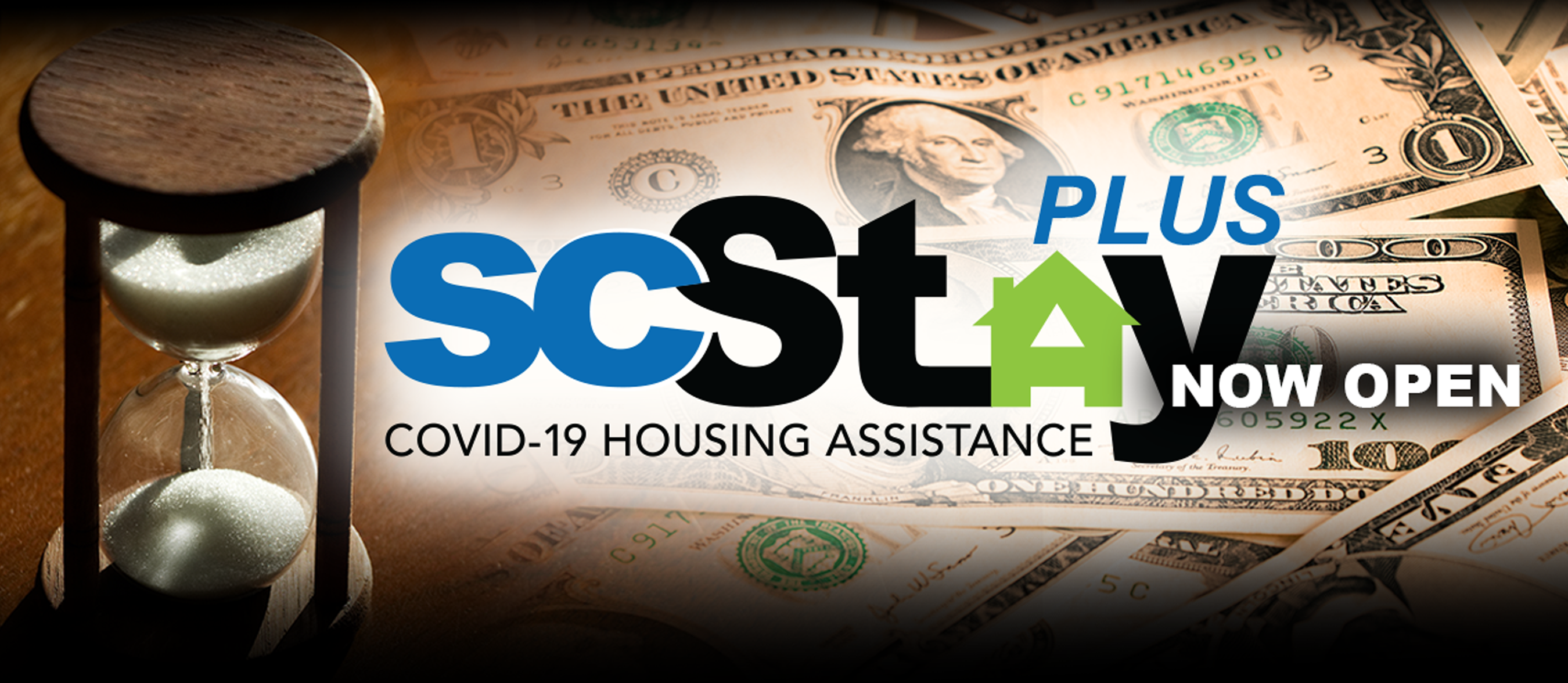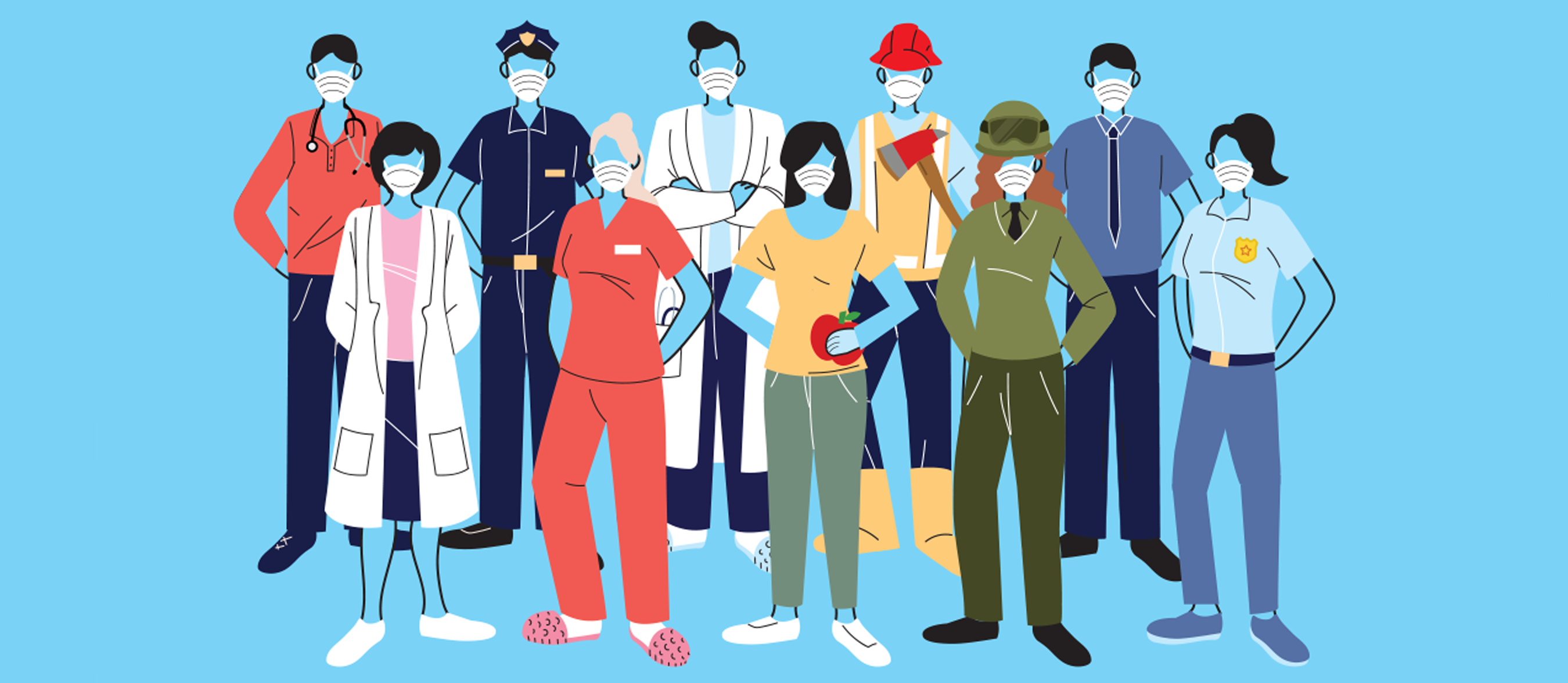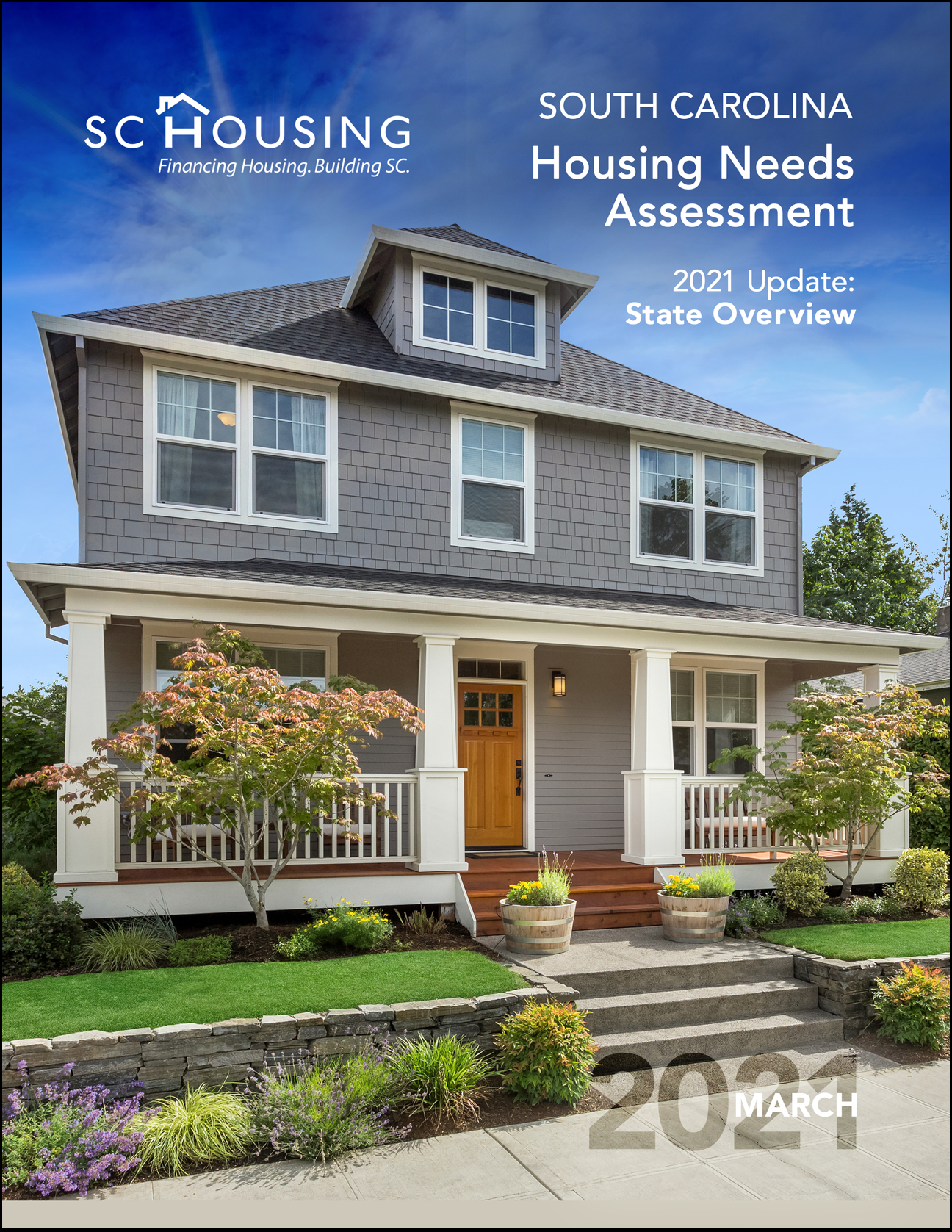- MAKE PAYMENTS
- PUBLIC NOTICES
- CONTACT
- INFORMATION RELEASE FORM
- The SC Housing HCVP waitlist is NOT open. Beware fake social media posts.

May/June 2021

Thousands apply for emergency rental program following May launch
Thousands of South Carolina residents who are behind on rent and utility payments due to the COVID-19 pandemic have already applied to SC Stay Plus, SC Housing’s newest emergency rental assistance program that launched May 5.
Those who qualify for the $272 million SC Stay Plus program may receive up to 12 months of assistance for back rent and utility payments dating back to March 2020. Applicants may also qualify for up to 3 months of future rent assistance. Residents can find the application portal for SC Stay Plus at SCHousing.com.
Assistance is available for households in which one or more individuals meet all the following criteria:
- Has qualified for unemployment or experienced a reduction in household income, incurred significant costs, or experienced a financial hardship directly or indirectly due to COVID-19 (i.e., since March 2020);
- Can demonstrate a risk of experiencing homelessness or housing instability; and
- Has a household income at or below 80% of county median income.
The following seven counties were directly funded by the U.S. Treasury and will operate their own assistance programs, so residents of these seven counties should apply to their county program at this time: Anderson, Berkeley, Charleston, Greenville, Horry, Richland and Spartanburg. Details about these programs can also be found at SCHousing.com.
Funding for the program is made available by the U.S. Department of the Treasury as part of a $25 billion rental and utility assistance package in the Consolidated Appropriations Act that Congress passed in December 2020. South Carolina lawmakers passed and Gov. McMaster signed a joint resolution (Act 17) in April to outline how the funds should be distributed in the Palmetto State.
Learn more about the SC Stay Plus program, eligibility rules and how to apply at SCHousing.com.
Experienced leaders join SC Housing’s Multifamily Development division
Two experienced leaders have joined the SC Housing Multifamily Division, a multimillion-dollar division that finances the construction of affordable rental housing throughout the state, through federal, state and agency-financed programs.
Eric Alexander has joined SC Housing as multifamily development director.

Alexander has almost two decades in affordable housing. Immediately prior to joining SC Housing, Alexander served as the assistant director of real estate development for housing programs, overseeing well over $100 million in gap financing funds for RI Housing in Providence, Rhode Island. In this role, he worked with non-profit and for profit developers, as well as various municipalities, to fund the construction, renovation, and acquisition of affordable housing, public facilities, and commercial improvements in the state of Rhode Island.
Additional prior experience includes work for the Manufactured Housing Institute of South Carolina and the national Manufactured Housing Institute, as well as both program staff and program leadership positions at the Massachusetts Department of Housing and Community Development.

Zan Zettler has joined SC Housing as multifamily finance manager.
Zettler joined SC Housing from the South Carolina Community Loan Fund (SCCLF), where he served as the organization’s first Credit and Portfolio Risk Officer, working to ensure the SCCLF’s credit policies were aligned with the organization’s strategic growth policy. His responsibilities included the underwriting of all commercial and counter party loans, developing capital structure for all loans, assigning of risk ratings to new and current portfolio loans, and developing and presenting borrower financing education programs.
Previously, Zettler worked with the City of Columbia’s Community Development Department, where he served as the Affordable Housing Program Manager. In that role, Zettler oversaw the mortgage loan programs, agency banking partnership relations, developer construction financing, and compliance for LIHTC projects.

Annual Palmetto Heroes program off to fast start
In the first five weeks of SC Housing’s annual Palmetto Heroes homeownership program, more than $25 million in home loans have been reserved by first-time homebuyers. That’s half of the $50 million committed to the program by SC Housing, which is celebrating its 50th anniversary.
SC Housing is helping community heroes by helping hundreds of them buy their first homes with low interest rates and thousands in down payment assistance. In recognition of South Carolina’s frontline workers who have stepped up to keep our state running during the COVID-19 pandemic, the 2021 Palmetto Heroes program provides down payment assistance and low-interest home loans to qualifying South Carolina teachers, medical professionals, firefighters, law enforcement, correctional officers, EMS personnel, active-duty military (including S.C. Army National Guard and S.C. Air National Guard), and veterans.
Eligible Palmetto Heroes homebuyers can get a historically low, fixed-rate mortgage through SC Housing’s First-time Homebuyer Program, as well as $12,000 in forgivable down payment assistance.
The Palmetto Heroes program has invested over $186 million over the past 14 years to help more than 1,500 homeowners purchase their first home. “Through the Palmetto Heroes program, we hope to recognize many South Carolina workers and families who sacrifice so much on behalf of all of us,” said Steve Clements, director of single-family programs at SC Housing, in a news release. “Home ownership is one of the most valuable tools to build wealth, and we are proud to help families attain this goal at a challenging time.”
For more information about the Palmetto Heroes program, visit SCHousing.com.
New Housing Needs Assessment finds inequities predate pandemic

A new SC Housing report found South Carolina’s vulnerable population was struggling to obtain affordable and sustainable housing even before the global COVID-19 crisis.
The 2021 South Carolina Housing Needs Assessment, which was published in late March, found that, while the economy continued to expand for many in the late 2010s, hundreds of thousands of South Carolina residents struggled to find affordable housing as home prices and new construction grew.
“There are a lot of conversations about how the pandemic disrupted lives and affected so many people’s ability to make rent and mortgage payments,” said Bryan Grady, Ph.D., chief research officer at SC Housing and author of the report. “But we can see from the data that too many South Carolina residents were spending more than they could afford on housing and utilities even before the pandemic.
“That is a systemic issue in our state and it is not sustainable. The pandemic has made that very clear.”
Details from the report’s executive summary include:
- Nearly a quarter of the state’s renters are considered “severely cost burdened,” meaning that they spend at least half of their income on housing and utilities, putting a substantial strain on household budgets.
- More broadly, a lack of affordable housing put a drag on the state’s economy of $9.4 billion in 2019, placing a strain on public programs and private charities to provide necessary items like food and child care. Overall, 31 percent of households simply could not make ends meet due to housing costs.
- The alarm that sounded on evictions with the release of the Princeton University Eviction Lab report did not lead to substantial changes to the system or circumstances, with more than 150,000 eviction filings occurring in 2019 –one for every four renters statewide.
- While much attention has been placed on the affordable housing crisis along the coast and in major metropolitan areas, the problem is not isolated. The average South Carolina renter cannot afford a basic two-bedroom apartment in 40 of the state’s 46 counties.
- Roughly one in 60 K-12 public school students statewide (nearly 13,000 overall) do not have homes or permanent residences. These children are either on the streets, in a homeless shelter, couch-hopping with relatives or friends, or living in motels.
Read the full 2021 SC Housing Needs Assessment report at SCHousing.com.

Connect with Us @@SCStateHousing
Are you interested in updates on our programs? Would you like to receive information on the latest breaking housing news and trends? Click the icons below to follow us on Facebook, Twitter, YouTube, Instagram and LinkedIn, and be sure to like our page!
Our Mission is to create quality affordable housing opportunities for the citizens of South Carolina.

